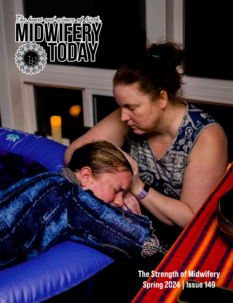
Fijian co-organizers Chandra Dayal, Filomeno Dokoni, Ratu Luke, Albert Mclaren and Sala Matiavi
Reflecting on Fiji
Editor’s note: This article first appeared in Midwifery Today, Issue 119, Autumn 2016.
Subscribe to Midwifery Today Magazine
Highlights from the Midwifery Today Conference
We had an amazing conference in Fiji. The midwives there responded so responsively to all they were being taught. Their loving openness was a joy for all of us to behold. Each morning began as a worship service. The midwives took an oath to basically put into practice all they learned at the conference. Here is what all agreed to do:
Every midwife has pledged to go back to their workstation and start implementing the knowledge gained regarding woman-centered care, which includes:
- Physiological birth
- Delayed cutting of cord
- Skin-to-skin contact, which initiates microbiome colonization, preventing lifestyle diseases (diabetes, digestive problems and behavioral/mental disturbances)
- Keeping motherbaby together
- A support person who addresses the needs of others (husbands/partners/mothers/sisters) during prenatal, labor and birth
- Continuity of care
- One-to-one care
- Minimizing intervention
- Empowering women to make informed choices and respecting their choice, which enables the woman to make birth plans appropriately
- Men as partners for women’s health
The Fijian midwives promised to share information with everyone from the doctors to the gardeners and to do an evaluation every month. They decided to create a draft of current midwifery practices with a design for their new way of practicing. They promised to introduce the International MotherBaby Initiative and to translate it into the Fijian language. They also plan to review and make new recommendations as needed and do ongoing inservice training for all.
It is so astounding to me that they would use the conference and the teaching therein as a jump-off point for revamping their whole system. These midwives and nurses really want birth to be loving and respectful for every motherbaby in Fiji. We all hope these ideas will influence all of the other 13 island nations in the South Pacific. Fiji will be an example where people can come to see how to change birth practices. (A Fijian midwife told me that birth there is 95% in the lithotomy position with an episiotomy!)
They made a decision to change their terminology as well, using words like motherbaby, fatherbaby (they coined that one!) birth, love, respect, kindness, humility, caring, faith and trust. If the whole world used that terminology, I don’t see how things wouldn’t change. These Fijian midwives decided to honor the rights and choices of women and to give information so they could make birthing decisions. They plan to change the physical environment of birthing to make it more relaxing and homelike with new paint on the walls, low light and quietness. Support people are to be incorporated into birth as much as possible. The birthing space is not always conducive to the presence of support people, but they will do what they can now and work on redoing the space as they can.
I learned that the midwives in Fiji really encourage and help moms with breastfeeding; they have a much higher breastfeeding rate than anywhere we have been in this world! They plan to do more of the things that help initiate breastfeeding, such as skin-to-skin contact and not disturbing the new motherbaby. This includes making cesarean births humane.
A three-year plan was drawn up to get various tasks done. During the whole conference, during breaks, a gathering of 10–20 midwives were meeting and making plans and apparently writing their decisions into well-crafted documents. This plan for the nation could be used almost anywhere because the plans and ideas are evidence-based and conceived with so much love and passion.
The plans that were drawn up were for both the short and long term. Within a year, they plan to institute the IMBCI MotherBaby Friendly initiative, revamp midwifery education and start a resource center and library.
The other exciting thing they are doing is starting a Pacific Association of Midwives. What is thrilling about that is that many of the seeds planted and carried out at the conference will begin to spread to the other island nations. The Fijian people are really very special. Maybe they will change the world of birth around the globe!
There are many other plans and I have their permission to share them. If you are thinking about ways you might revamp your area of the world, I can send you a copy of their plans and how they laid them out.
Another exciting aspect was the presence of the Hon. Josaia Voreqe Bainimarama, Fiji’s prime minister, who gave the welcome speech at the start of the conference. His speech has been copied on the following page. It was truly an honor to have the Fijian prime minister attend our humble midwifery conference.
Jan Tritten is the founder and editor-in-chief of Midwifery Today magazine and a midwife who was in active practice from 1977 to 1989. She became a midwife in 1977 after the powerful homebirth of one of her daughters. Her mission is to make loving midwifery care the norm for birthing women and their babies throughout the world. Meet Jan at our conferences around the world!
Bula vinaka and a very good morning to you all.
The birth of her child is a moment of great stress for any woman. But the joy that also accompanies childbirth is always made much greater by the comfort and support of the person who delivers the baby and assists the mother in her most critical hour.
Many mothers remember the person who delivers their baby with intense gratitude for the rest of their lives. For the confidence and encouragement they gave them—as well as the practical support—and especially if it is a first child.
Midwives are among the most valued and respected individuals in our societies. So, I’m delighted and honored to be with you all today as you gather for this international conference of midwives, co-hosted by the Fiji National University and the Midwifery Today Alliance.
The Alliance, as many of you know, is an American-based organization dedicated to spreading best practice in midwifery throughout the world, to make the act of giving birth the best possible experience for mothers and babies and to share the latest information on safe birthing practices with everyone: midwives, obstetricians and also people who aren’t formally trained midwives, such as general nurses or birth attendants in traditional societies.
The work of the Alliance is especially appreciated in Fiji and in other Pacific countries because of your particular emphasis on improving the birthing experience for women at the grassroots in our societies. And I want to warmly thank the representatives of the Alliance who are with us here today for your collaboration with the FNU and the service you are providing to our people.
To all our midwives, I want to say how much Fiji and the other island nations value and appreciate your contribution to our women and to our nations. I cannot emphasize enough how important you are in all our societies. It takes a particular type of person to want to be a midwife—someone who is loving, compassionate and dedicated.
You will have all had some very challenging experiences and sometimes tragic ones. There can be few things more upsetting than the loss of a child or a mother during the birthing process. But I am certain that the emotion of joy that accompanies most births must make this one of the most deeply satisfying careers in the whole world. And I encourage every young person with an affinity and empathy for our mothers and babies to consider training as a midwife.
As we all know, there has been a chronic shortage of midwives in many Pacific countries over the years. We need more midwives and we need to train them better. And Fiji is very proud of its role in being a training center for midwives and imparting the skills that have been deployed throughout the region.
We have close to 400 midwives in Fiji who deliver about 80% of the normal births in our various health facilities—major hospitals and sub-divisional hospitals, as well as emergency deliveries in health centers.
We have a number of ongoing training programs in place to improve the quality of the care we provide. And we very much appreciate the opportunity this conference gives us to network and collaborate with our colleagues elsewhere and to gain access to the latest information and techniques to enable Pacific mothers to get the safest natural birthing experience available anywhere.
With our international partners, we are updating our knowledge and our skills with a particular emphasis on the challenges we face in the Pacific. We are conscious of cultural sensitivities and are working to tackle those cultural practices that may be harmful to women and babies. And we firmly believe in a holistic approach to safe birthing practices, which is reflected in the people we have brought together for this event: obstetricians, midwives, general nurses and traditional birth attendants. I urge you all to work together to make the practice of giving birth as safe as it can possibly be for our mothers—the bedrock of our societies—and for our babies—the future of our nations on whom we all depend.
I am especially pleased to learn that one of the outcomes of this conference will be to establish a Pacific Midwifery Society. A formal grouping like this not only provides a better forum for the exchange of “best practice” information, but we are working towards enhancing the status of midwives by establishing them as a specialist class, and—resources permitting—giving them the career paths and the better pay they deserve.
In closing, I again welcome our international visitors to Fiji and wish you all a very successful conference. I join the mothers and fathers of the Pacific in saluting you all for the service you are giving our nations and the loving care and expertise you provide.
This is a day to celebrate the midwives of the Pacific, wherever they are. And I have the greatest pleasure in declaring this conference open.
Vinaka vakalevu. Thank you.
—Hon. Josaia Voreqe Bainimarama, the Prime Minister of Fiji

 Jan Tritten is the founder, editor, and mother of Midwifery Today magazine and conferences. Her love for and study of midwifery sprang from the beautiful homebirth of her second daughter—after a disappointing, medicalized first birth in the hospital. After giving birth at home, she kept studying birth books because, “she thought there was something more here.” She became a homebirth midwife in 1977 and continued helping moms who wanted a better birth experience. Jan started Midwifery Today in 1986 to spread the good word about midwifery care, using her experience to guide editorial and conferences. Her mission is to make loving midwifery care the norm for birthing women and their babies in the United States and around the world. Meet Jan at our
Jan Tritten is the founder, editor, and mother of Midwifery Today magazine and conferences. Her love for and study of midwifery sprang from the beautiful homebirth of her second daughter—after a disappointing, medicalized first birth in the hospital. After giving birth at home, she kept studying birth books because, “she thought there was something more here.” She became a homebirth midwife in 1977 and continued helping moms who wanted a better birth experience. Jan started Midwifery Today in 1986 to spread the good word about midwifery care, using her experience to guide editorial and conferences. Her mission is to make loving midwifery care the norm for birthing women and their babies in the United States and around the world. Meet Jan at our 
















